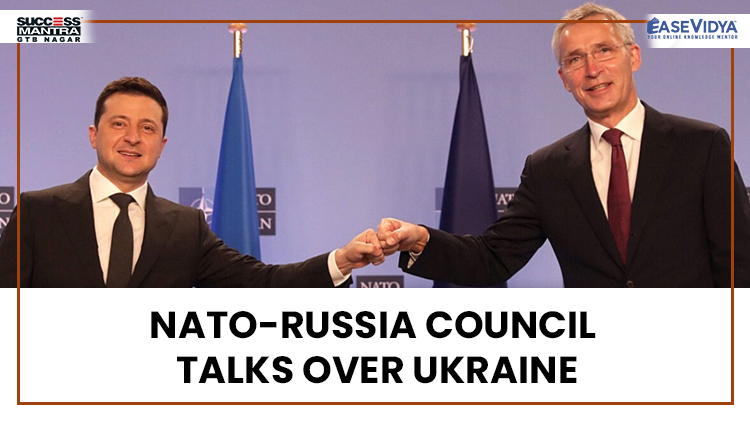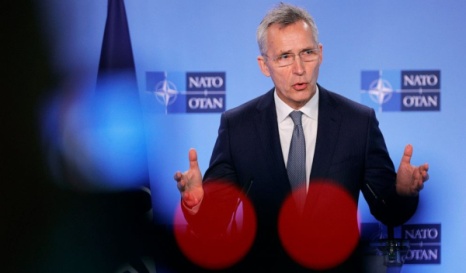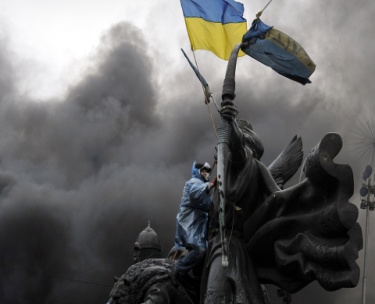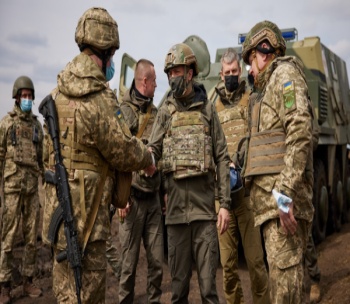
NATO RUSSIA COUNCIL TALKS OVER UKRAINE
NATO-RUSSIA COUNCIL TALKS OVER UKRAINE
The North Atlantic Treaty Organisation (NATO) and Russia discussed the ongoing situation in Ukraine and its implications for security in Europe. The talks happened at the NATO-Russia Council (NRC) which took place at the NATO headquarters in Brussels. NRC is a forum for consultation with Russia on security issues and cooperation. NATO was founded in 1949, and is meant to ensure collective protection for its members — the United States, Canada, and American allies in Europe — against the threat of possible post-War communist expansion and aggression by the Soviet Union. The Soviet Union too, formed its own defence and political alliance with Eastern European nations as a counterbalance to NATO — the Warsaw Pact that was signed in 1955. This alliance was disbanded after the dissolution of the Union of Soviet Socialist Republics (USSR) in 1991. NATO has traditionally focused on Russia and the European neighbourhood, and recognises the need to deter “revisionist” and “militarily advanced” Russia, and the threat posed by rogue nations such as North Korea.

Since April 2014, practical civil and military cooperation under the NRC with Russia has been suspended. This happened in response to Russia’s military intervention in Ukraine and its annexation of Crimea from Ukraine, which NATO allies do not recognise and have referred to as “illegal” and “illegitimate”. This was the first time since WWII that a European nation had annexed territory from another country. The region that Russia annexed in 2014 is now under Russian-backed separatists and even today fighting continues there.
Current Affairs Notes By Success Mantra Coaching Institute GTB Nagar Delhi CLICK HERE
NATO-RUSSIA COUNCIL
NRC was established at the NATO-Russia Summit in Rome (Rome Declaration) on 28 May 2002. It replaced the Permanent Joint Council (PJC), a forum for consultation and cooperation created by the 1997 NATO-Russia Founding Act on Mutual Relations. The NRC is a mechanism for consultation, consensus-building, cooperation, joint decision and joint action, in which the individual NATO member states and Russia work as equal partners on a wide spectrum of security issues of common interest.
HIGHLIGHTS OF THE MEET
NATO rejected Russia's demand for a new security settlement in Europe, challenging Russia to withdraw troops deployed near Ukraine and join talks on reducing the threat of open conflict. For the US and EU, Ukraine acts as a significant buffer with Russia. Ukraine is also building a naval base in Ochakiv and another in Berdyansk, which Russia is not happy about. The Western allies received no promise that Russia will stand down its forces — which Moscow insists pose no threat to its already partially occupied neighbour — despite the threat of economic sanctions. Russia demanded not to admit any more members into NATO and to withdraw western forces from its Eastern Allies. It also warned that the continued deterioration could lead to the "most unpredictable and most dire consequences for European security. There are significant differences between NATO allies and Russia which will not be easy to bridge.

India’s Stance over Russia Ukraine Crisis: India did not join the Western powers’ condemnation of Russia’s intervention in Crimea and kept a low profile on the issue. In November 2020, India voted against a Ukraine-sponsored resolution in the United Nations (UN) that condemned alleged human rights violations in Crimea thereby backing old ally Russia on the issue.
BACKGROUND OF UKRAINE-RUSSIA CONFLICT
Ukraine and Russia share hundreds of years of cultural, linguistic and familial links. For many in Russia and in the ethnically Russian parts of Ukraine, the shared heritage of the countries is an emotional issue that has been exploited for electoral and military purposes. As part of the Soviet Union, Ukraine was the second-most powerful Soviet republic after Russia, and was crucial strategically, economically and culturally.
Cause of Conflict:
- Balance of Power: Ever since Ukraine split from the Soviet Union, both Russia and the West have vied for greater influence in the country in order to keep the balance of power in the region in their favour.
- Buffer Zone for Western Countries: For the US and the European Union, Ukraine is a crucial buffer between Russia and the West. As tensions with Russia rise, the US and the EU are increasingly determined to keep Ukraine away from Russian control.
- Russian Interest in Black Sea: The unique geography of the Black Sea region confers several geopolitical advantages to Russia. Firstly, it is an important crossroads and strategic intersection for the entire region. Access to the Black Sea is vital for all littoral and neighboring states, and greatly enhances the projection of power into several adjacent regions. Secondly, the region is an important transit corridor for goods and energy
UKRAINE'S BID TO JOIN NATO
The Ukrainian President urged the North Atlantic Treaty Organization (NATO) to speed up his country’s membership in the alliance. Ukraine hopes to be invited this year to join a NATO Membership Action Plan (MAP).
Reasons for Ukraine to Join NATO:
Ukraine is of the opinion that joining NATO is the only way to end fighting with pro-Russia separatists. There is an increase in clashes and Russian military movements on the border raise fears of an escalation of the separatist conflict in eastern Ukraine. Ukraine accuses Russia of massing thousands of military personnel on its northern and eastern borders as well as on the Crimean peninsula (annexed by Russia in 2014). Ukraine’s Western allies have rushed to its defence, with a series of statements warning Russia against taking further action. India did not join the Western powers’ condemnation of Russia’s intervention in Crimea and kept a low profile on the issue.

NORTH ATLANTIC TREATY ORGANIZATION
It is a military alliance established by the North Atlantic Treaty (also called the Washington Treaty) of April, 1949, by the United States, Canada, and several Western European nations to provide collective security against the Soviet Union. A key provision of the treaty, the so-called Article 5, states that if one member of the alliance is attacked in Europe or North America, it is to be considered an attack on all members. That effectively put Western Europe under the "nuclear umbrella" of the US. As of 2019, there are 29 member states, with Montenegro becoming the latest member to join the alliance in 2017.
CONCLUSION
A practical solution for the situation is to revive the Minsk peace process. Therefore the West (US and Other western Countries) should push both sides to resume talks and live up to their commitments as per the Minsk agreement to restore relative peace on the border. The US should also seek agreement from all parties to engage more directly in an OSCE-mediated process to stem the ongoing damage to European security, the deepening human and economic costs, and the threat to Ukraine's sovereignty.
PRAVAHINI Current Affairs Notes By Success Mantra Coaching Institute GTB Nagar Delhi CLICK HERE
TEST YOURSELF
Q.1 The North Atlantic Treaty Organisation (NATO) and Russia discussed the ongoing situation in _________ and its implications for security in Europe?
- Kazakhstan
- Turkey
- Ukraine: ANSWER
- None of the following
Q.2 Which of the following articles of NATO states that if one member of the alliance is attacked in Europe or North America, it is to be considered an attack on all members?
- Article 3
- Article 5: ANSWER
- Article 12
- None of the above
Q.3 North Atlantic Treaty Organization which is an intergovernmental military alliance between the nations is headquartered at which place?
- Geneva, Switzerland
- New York, USA
- Washington DC, USA
- Brussels, Belgium: ANSWER
Q.4 Collective Security Treaty Organization a Military Alliance which was signed in May 1992 and aims at collective and national security is headquartered in ___________?
- Minsk, Belarus
- Nur Sultan, Kazakhstan
- Moscow, Russia: ANSWER
- Vladivostok, Russia
Q.5 How many countries are the members of the military alliances of North Atlantic Treaty Organization & Collective Security Treaty Organization respectively?
- 25 & 5 members respectively
- 28 & 6 members respectively
- 30 & 6 members respectively: ANSWER
- 32 & 8 members respectively












0 Comment